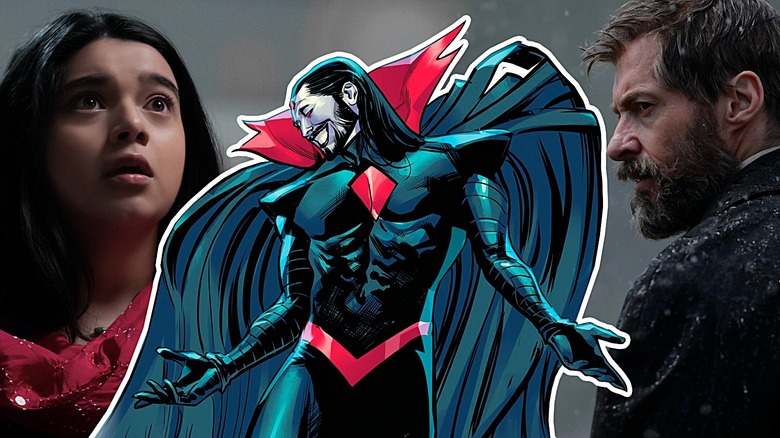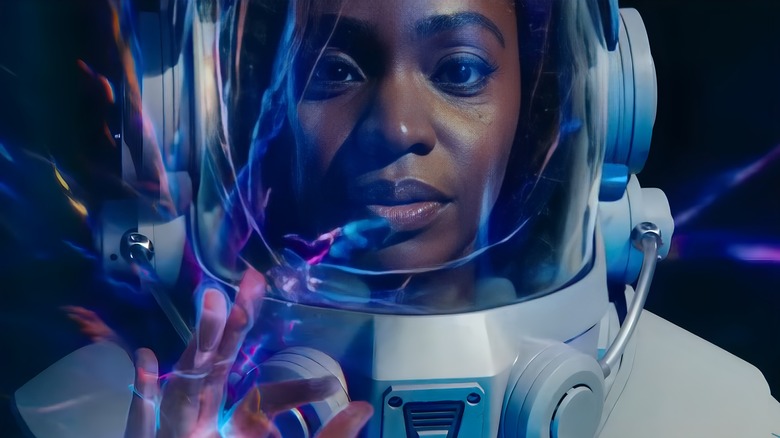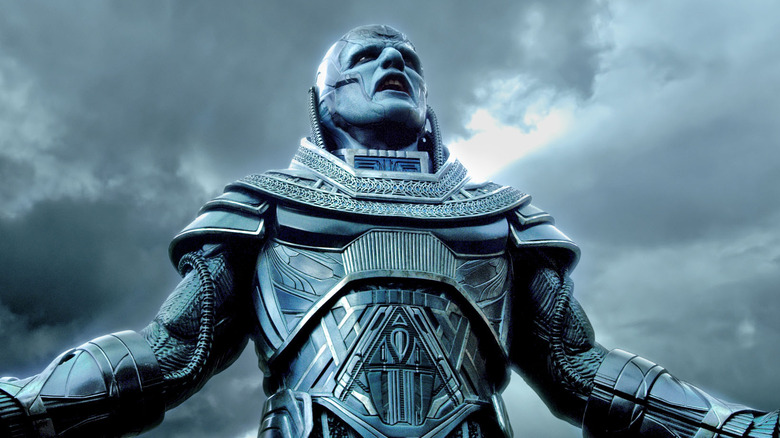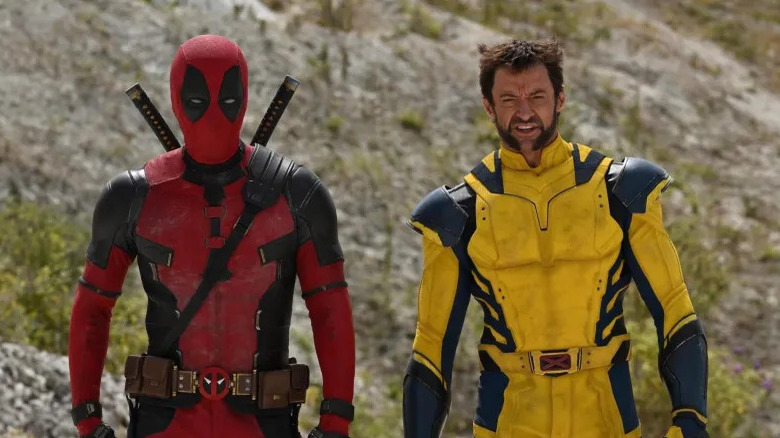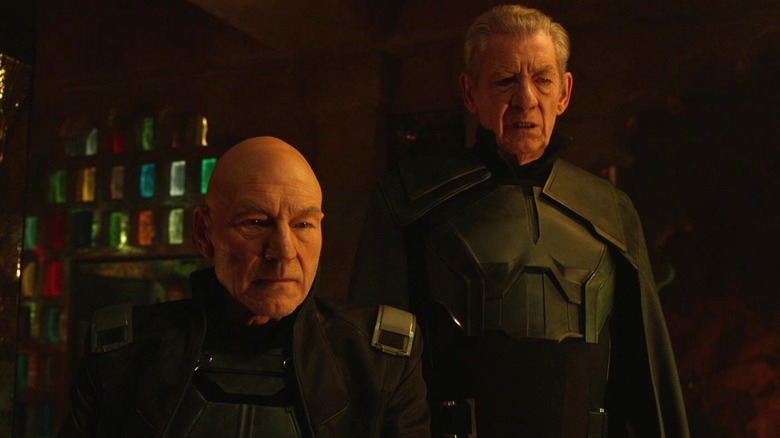MCU Theory: The X-Men Movies Teased A Marvel Villain Who May Cause A Mutant Saga
Before Marvel regained the movie rights to the X-Men, 20th Century Fox (renamed by Disney as 20th Century Studios) had a plan, and no, it didn't involve Dark Phoenix ... again ... probably. This plan involved scattered hints across multiple projects that another Big Bad was hiding out in the shadows, just waiting for the right movie to make his grand entrance. Agents of this villain and branches of his company appear in "X-Men: Apocalypse," "Deadpool 2," and "New Mutants." His given name is Dr. Nathaniel Essex, as in the founder of the Essex Corporation and the Essex House for Mutant Rehabilitation, but his chosen moniker is Mister Sinister.
To look at him is to see a pale, vampiric creature with raven hair, red eyes, and a certain fondness for black clothing. But despite all of these warning signs, Sinister is less Dracula and more Dr. Frankenstein. His passion, if you can call it that, is genetic experimentation.
Sinister's two primary objectives within the realm of scientific advancement involve the creation of clones to prolong his own life and the creation of powerful mutants to shorten the lives of his enemies. But while Fox never got the chance to adapt Sinister for the big screen, the Marvel Cinematic Universe absolutely should. His inclusion in the MCU could have the kind of lasting ramifications that would justify a sudden influx of mutants, not to mention a sudden influx of fully realized, fully grown, familiar characters, like Cyclops or Storm. Sinister could even justify the return of the Fox-era actors in a more diegetic way than "Deadpool 3," and, believe it or not, it's all thanks to "The Marvels."
A new universe with familiar mutants
The post-credit sequence for the "Captain Marvel" sequel reveals Monica Rambeau (Teyonah Parris), trapped in a different universe and lying on what appears to be a hospital bed beneath the X-Mansion — The X-Mansion from Fox's adaptation, specifically. The two biggest clues indicating this are the sterile, white aesthetic and the inclusion of Kelsey Grammer as Dr. Hank McCoy, aka Beast. He looks a little different than "X-Men" fans might be accustomed to, what with his being digitally rendered as opposed to having Grammer wear practical makeup, but it's definitely him. He's not the first Fox actor to cross over, but he is the first to not be immediately killed or otherwise wasted on a humorless erection joke.
Meanwhile, on Earth-199999, "The Marvels" concludes with Carol Danvers (Brie Larson) and Kamala Khan (Iman Vellani) confident in their ability to rescue Monica. As the MCU's first confirmed mutant, Kamala's connection to this narrative arc feels important, but it also complicates things. If she's a mutant, then there's a small possibility that some version of the X-Men already exists in the primary continuity and that they've actually been around this whole time. Following that thread to its natural conclusion would mean that Professor X and his super school, packed with proactive superheroes, chose to ignore every single major event in the MCU ... which would suck. A lot. So let's pretend that's not even a possibility.
And while "Deadpool 3" is set to bring both Ryan Reynolds' Wade Wilson, aka Deadpool, and Hugh Jackman's Logan, aka Wolverine, into the MCU, how are the rest of the mutants going to make their entrance? Well, that's where Mister Sinister could come into play.
Earth-199999 could be Sinister's sandbox
In the comics, Mister Sinister operates under a warped code of ethics. He believes that suffering is okay, so long as that suffering leads to scientific results. These boundaries permit him, for example, to kidnap mutants and experiment on them like lab rats, but they prevent him from stepping outside with a Glock and a blindfold. It's not much of a distinction, although it does put him on a slightly different level than the High Evolutionary (Chukwudi Iwuji), Marvel's most vicious movie villain. The reason that Sinister would be the best villain to kick off the MCU's mutant saga is that he possesses a handy little catalog of every single living mutant's genome. (Just don't ask how he collected the samples.) Should he find it necessary, Sinister could clone any given mutant at any given time.
Assuming that "The Marvels" depicts Fox's "X-Men" franchise as a branch of the multiverse, then Sinister already exists in the MCU. What's more, if Carol Danvers and Kamala Khan are capable of finding a way in, then Sinister is capable of finding a way out. Why would he want that? Well, Sinister's origin story involves a nasty encounter with Apocalypse (Oscar Isaac), another mutant that we know exists within Fox's X-Men universe. Without diving into the convoluted lore, just know that Sinister wants to rid himself and the world of Apocalypse. He's never really successful at achieving this goal, so why wouldn't he take the opportunity to escape to another, Apocalypse-free universe?
And if he found himself in a universe where mutants don't widely exist, what do you think a scientist capable of cloning, who also happens to own a collection of every single mutant's DNA, would do? Earth-199999 would become Sinister's sandbox.
X-Men clones could be cool, actually
While some fans might balk at the MCU's canon X-Men being multiversal clones, there are some solid narrative benefits to taking this approach. First, it gives the mutants a reason to distrust the general population, and the general population has a reason to distrust mutants. Remember, the whole point of the "X-Men" narrative is that they are not accepted by humanity, a not-so-subtle allegory to America's historically racist infrastructure. Right now, the MCU spends as much time loving superheroes as it spends questioning their vigilantism, so a sudden shift in public opinion might not feel genuine without additional factors. Making them appear en masse without explanation would serve that very purpose.
Furthermore, if Sinister clones the X-Men, then the MCU gets to pick and choose which actors to bring back from the Fox X-Men universe in a completely new context without concocting new origin stories for them. The hype for a film project like this could rival "Spider-Man: No Way Home" (a franchise that could spawn its own clone saga). Marvel knows this; otherwise, "Deadpool 3" wouldn't literally be a buddy film starring Ryan Reynolds and Hugh Jackman. Introducing the X-Men as Sinister's clones would provide them with a deeply personal and actionable reason to oppose the guy.
Again, it would be an unforgivable disservice to Scott Summers (James Marsden) and his team if it's revealed that they've been watching the world crumble from the cozy confines of a private school mansion since 2012. Besides, the MCU is too deep in its own canon to write in retcons this significant. Mutants, as a whole, must come from some external source, and Sinister comes prepacked with a perfect justification for that very thing.
Sinister makes more sense than Magneto
Aside from Dark Phoenix and Apocalypse, the X-Men only have one other major villain that the wider community is aware of, and it's getting harder and harder to pretend Erik Lehnsherr, aka Magneto, is a bad guy. He is the sleeping giant that foolish men wake, and every version of his story fabricates a different idiot to stir him to wrath. His devastation is almost always reactionary — meted out tenfold, unquestionably lethal, and excessively dramatic, but reactionary nonetheless — and in the name of mutant rights. Conversely, Sinister is far less morally gray; he worked with the Nazi party during their reign of terror because their view on mutant experimentation matched his own, for God's sake.
Speaking of Nazis, Magneto's origin story is rooted in Auschwitz, so unless his mutant abilities secretly include an unnaturally long life, this critical and tragic piece of Magneto's backstory prevents him from being a Big Bad in the MCU, which is currently somewhere in the mid-2020s and only moving further away from 1940. Meanwhile, Sinister's origin is less of a fixed point in time. His story begins somewhere in the 1800s, sure, but its details inherently and drastically alter his life expectancy.
Ignoring all of that, though, the bigger issue is that Magneto's been done before and Sinister hasn't. If we're already working with a familiar group of characters and potentially familiar actors, something needs to be new to keep the story fresh, and nothing says fresh quite like a Victorian-era, quasi-immortal eugenicist, don't you think? And, hey, if Sinister doesn't work out, he could always clone a younger Magneto into the MCU, just to shake things up.
